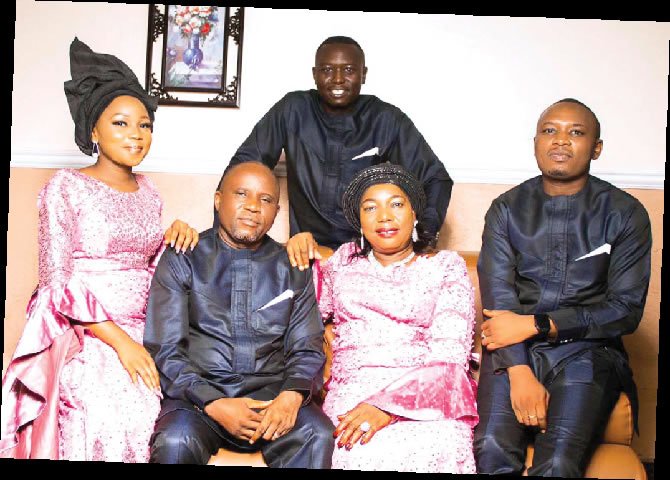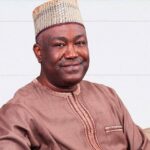
Mr Kefas Magaji, a lawyer, is the Special Adviser to the Bauchi State Governor on Legal Matters. In this interview with ARMSTRONG BAKAM, he speaks about his parenting experience
At what age did you become a father?
I became a father at the age of 30. I graduated at age 25 and I started legal practice after doing my compulsory one-year national youth service. About three years after I began my law practice I got married. A year after, we had our first child.
Would you say you got married at the right time?
Yes, because I married at the time I thought I was due for marriage. I was already (financially) stable. I was no longer dependent on my parents or anybody else for money. So, I decided it was the right time I should get married.
Did you have any form of anxiety while starting your family?
Well, as a human being, you are bringing in somebody (wife) to live with you – and not to live with you for a while but to live with you for life – so, certainly, there are fears about the question of compatibility. Yes, we were in courtship for a long time, we were friends for long but some of those thoughts will cross your mind: This friendship that you’ve passed through, can you sustain it for the rest of your life? This is because you don’t marry with the thoughts that you will one day part ways, but you are marrying with the understanding that you will stay together for life. So, there were some of those initial fears but because I was in love with my wife, I believed that she’d be a good partner.
For becoming a father, I didn’t have any fears. Shortly after we got married, we thought it was time to begin to have children. We gave ourselves a period of six months, and then decided and agreed it was time for us to start having children and that was when my wife took in. So, at the time my first child came, I was ready for him. After my wife took in, we started preparing for the arrival of the baby. So, I was ready.
Has being a father changed anything about you?
Since I made up my mind to get married, I told myself that it was time to discipline myself. When I say discipline myself, it was not as if I was irresponsible or bad. One thing that helped me was that since I was in the university, I made up my mind to go into private legal practice, I wasn’t prepared to do any government work and I knew for me to succeed, I must give so much time to the legal practice. I wasn’t coming from a family that had that orientation of setting up a business, I didn’t come into that field as a first-timer, so I knew I needed to give it extra time. And at the time I was going into it, my friends had told me that it was just pride because the tradition then was for young lawyers to seek employment in the Ministry of Justice. The day I came back from youth service, I had an appointment letter already waiting for at the Ministry of Justice. I collected the appointment letter, but I didn’t write the acceptance letter. So, my friends who accepted the job and went to the ministry said I was acting out of pride. They knew I didn’t have the kind of parental backing that could support me to go into private practice. But I told myself that no matter what it took, by God’s grace, I would succeed. So, I decided to give my practice the whole of my time; I didn’t have time for leisure and that was what I meant when I said I disciplined myself.
When I had my first child, I knew it was my responsibility to nurture the child to be who I want him to become. It was therefore, incumbent on me to make sure I provide all I needed to provide for the upkeep of the child, to sustain the home and I knew also that the peace of the home would provide an environment for the child to grow into a responsible adult. I also knew that one of the attributes of a peaceful home is when I am able to provide the basic needs of my family. Certainly, if one is not able to provide some of those basic things a woman would need for the upkeep of the home, you’ll begin to have issues. I knew all these things and I had participated in a few (court) cases that had to do with family, so I knew some of those things that could bring issues in the home and I prepared for this. Fatherhood helped me to really become what I am today.
As a lawyer and politician, how are you able to balance work and family obligations?
When I was in active legal practice, I knew it was taking so much of my time, but from time to time when I came home, I would interact with my children. I would want to see what their performances in school were like, but that was a ministry I committed to my wife and she was doing essentially some of those things and mine was just a periodic intervention. When I joined politics, I continued with that supervisory role while my wife was doing the essential day-to-day checking of the children’s academic progress. Today, all our children are grown up. My last daughter is currently doing her national youth service; in fact, all of my children don’t stay with me anymore. But I make sure I create time for them.
Were you particular about the gender of your firstborn?
No, but before we started having children, we picked names for them. We picked gender neutral names for all our children. My first child is ‘Love’, my second child is ‘Peace’ while the last is ‘Joy’. Our original plan was to have two children, we were hoping for a male and female. Our firstborn is a male, the second is a male. So, my wife and I agreed to have one more child, hoping that we’ll have a girl.
Were you in the labour room with your wife during the birth of any of your children?
No. I always took her to the hospital and I would be outside. And I think at that time, it was not allowed for the man to go into the labour room.
What was the experience like for you waiting outside the labour room?
She would be in pains while I took her to the hospital and on getting to the hospital, naturally, it was a moment of anxiety. One would naturally be worried and so many thoughts would keep crossing one’s mind.
Did that experience make you appreciate your wife better?
Well, that really made me understand that women make a lot of sacrifice in giving birth to children with the kind of excruciating pains they go through. But another exciting thing is that the moment the baby comes out, the woman forgets the pains she went through because she’ll be overwhelmed with the joy of having the baby. That tells us something about life and the goodness of our creator.
Were there lessons you learnt from your parents that you applied in raising your own children?
First of all, when I was growing up, my father made sure to keep me under check. My father was not into alcohol, so he made sure I had nothing to do with alcohol. Children had the tendency of going around irresponsibly, but my father made sure I didn’t do that, he was interested in knowing when I was in the house. If I was going out, he wanted to know how early I would be coming back, he had some time frame, which I must not exceed and on no excuse would I not go to school. He made sure that I did my duties in the house. He was a trader and the rule was that I must join him at the shop once I returned from school. And when we closed the shop later in the day, I went home straight. So, as a kid, I grew up not having time to play games or participate in sports because I was always in my father’s shop. When I got to secondary school – I attended a boarding school – I couldn’t do sports because I wasn’t used to it. So, even as an adult, you won’t see me in the stadium watching football or any of those things; and even at home, I don’t watch football because I didn’t develop the interest at the early stage.
Did you apply this in raising your children?
Well, I tried to, but my first child, for instance, gave me a lot of problems at the early stage. When he was in the university particularly, he was troublesome. But surprisingly, he has changed for the better now.
What discipline method did you adopt in correcting your children when they erred?
There were times I used cane on my children. If I talked to them and they didn’t listen, I would use cane to inflict some pains on them to show my displeasure with their behaviour or action.
Do you sometimes undertake some house chores to help your wife?
To be honest with you, I don’t know how to cook, so I hardly go to the kitchen with her. When I went for my NYSC programme, for the one year I was in national service, I never cooked. When I started law practice, before I got married, I literally, didn’t have a kitchen. I would go to the restaurant to eat. And when I got married, the thing didn’t change and I am not really proud of that.
How do you reward your wife for taking care of the home?
Periodically, I surprise her with gifts; it could be money or other gift items. You know that when it comes to money, women like that. When I travel, particularly when I go on foreign trips, I make sure I get her some of those things she likes. There’s no foreign trip I go without buying her some gifts.
Was there a period in your parenting experience that you found very challenging?
The most challenging times in parenting are the times the children do things you don’t approve of, it can be quite painful. The scripture says that you reap what you sow but when you discover that you’ve tried to give the children the best but they are not giving you what you want, it’s always a challenge. At a point, my first son abandoned education when he was in the university. I was then in Abuja, so I invited him and I gave him some assignments and to my surprise he couldn’t perform. And I when I inquired further, I learnt that he was not even attending lectures in school. Something like that can be quite painful. He had to come back home and write UTME and go to another university. I found those moments quite challenging. Indeed, when he was in the second university, which was a private university, there was a time he was expelled for misbehaving. As a father, that was terribly painful. He abandoned one university and went to another university, a private university, where I paid so much money, still he wasn’t serious. All through, I was living under fear, but after he finally graduated he gradually began to come his senses and stopped doing all the terrible things used to do. And now that he is working, he has completely changed. That is what prayers can do.
What advice do you have for youths about marriage?
They should understand that one does not get married just because they want to start having sex or because they crave having a partner. They should get married when they are sure they are ready for the responsibilities that come with being married. They must be sure they have the means to meet such responsibilities. Again, they must have the necessary psychological discipline to deny themselves some of the usual pleasures of youth and be focused in life.
Copyright PUNCH.
All rights reserved. This material, and other digital content on this website, may not be reproduced, published, broadcast, rewritten or redistributed in whole or in part without prior express written permission from PUNCH.
Contact: [email protected]














